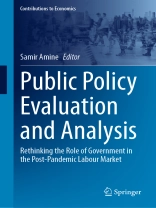This edited volume examines how some OECD countries have adapted to new challenges in the labor market by evaluating and analyzing public programs implemented before, during, and after Covid-19. To gain a comprehensive understanding, the volume adopts a multidisciplinary approach, with chapters contributed by authors from diverse disciplines and academic and professional backgrounds.
Inhoudsopgave
Systems Approach for Sustainability Systems Approach for Sustainability.- Corporate Governance and Sustainability: The Role of the Board of Directors.- Breaking the Chains: Addressing Modern Slavery as a Matter of Good Sustainability Practice.- Addressing Climate Change Together: A Systems Thinking and Stakeholder Focused Intervention Perspective to Engaging SMEs on Carbon Emissions Reduction and Net Zero Schemes.- Leadership Gender Diversity as a Factor Driving ESG Disclosure: Overview of the Global and Emerging Markets.- Sustainable Social Impact Measurement in Small Organisations.- The Revolutionary Impact of Verified Plastic Credit Schemes: A Catalyst for Sustainable Business Practices and Community Empowerment in Developing Countries.- Bridging the Green Gap: Barriers to Sustainable Residential Construction in Nigeria.- Value Added Products from Fruit Waste: A Systematic Review.- Sustainability in Aviation, and Safety Culture.- Navigating Rural Smart Transitions: Strategies, Challenges, and Case Studies.- Challenges of Implementing the ECOWAS Protocol on Trans-humance Across Member States, Agrarian Livelihood Protection, and Ecological Sustainability.
Over de auteur
Samir Amine is a labour economist and full professor in the department of labour and industrial relations at the Université du Québec en Outaouais. He is a researcher and fellow at the Centre Interuniversitaire de Recherche en Analyse des Organisations (CIRANO). A recipient of the ‘Christiane-Melançon’ award for professors, his research interests focus on the analysis and evaluation of public policies, particularly on the labour market.












